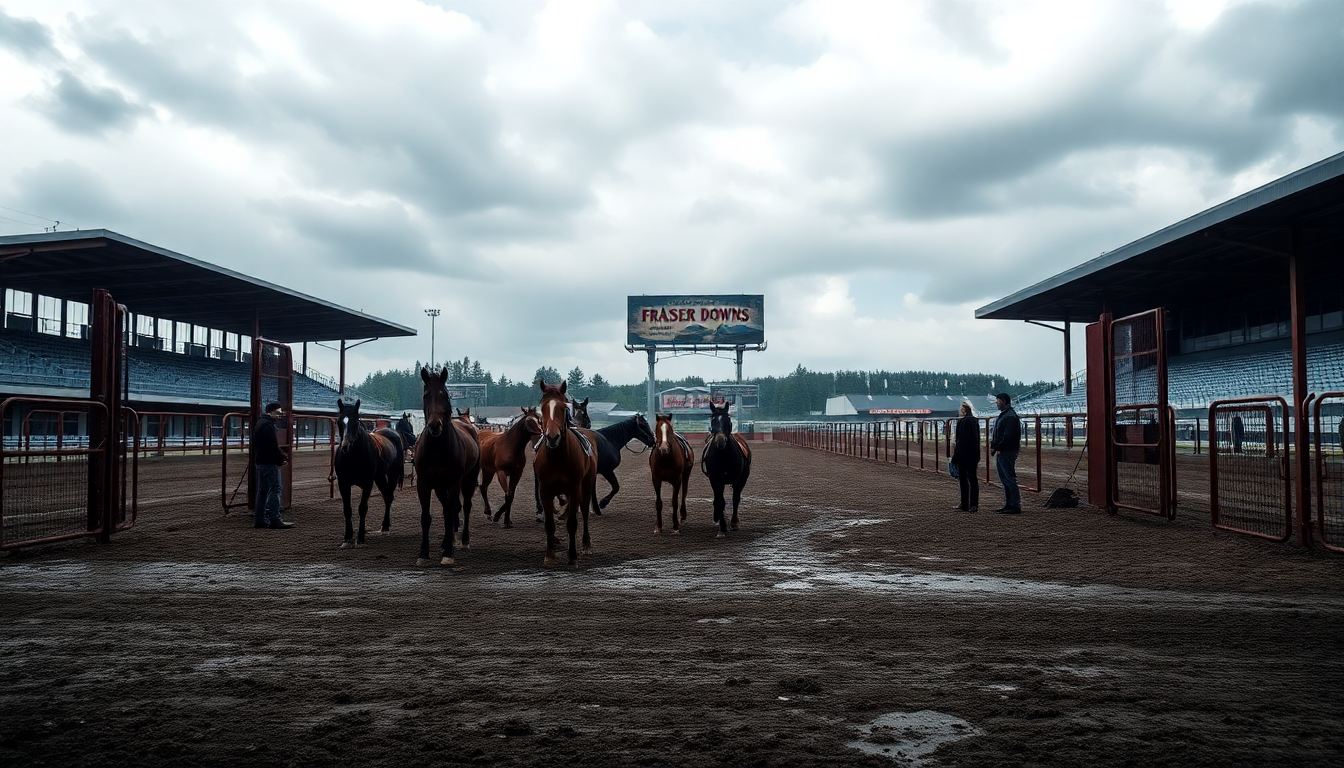Table of Contents
The recent closure of Fraser Downs Racetrack in Cloverdale has sent shockwaves through the local harness racing community. This unexpected announcement, made without any prior warning, has left trainers, grooms, and horse owners scrambling to find solutions for their displaced horses and livelihoods. As the only standardbred racing facility in British Columbia, the ramifications of this decision extend far beyond the immediate community, raising serious questions about the future of the harness racing industry in the region.
The Immediate Impact on the Community
Fraser Downs Racetrack’s abrupt shutdown, prompted by the City of Surrey’s decision to terminate its lease, has left many in the harness racing community feeling a mix of anger and uncertainty. Trainers who had been preparing for the upcoming racing season now find themselves without a venue. Randy Rutledge, a local farm owner, expressed his frustration over the lack of notice, a sentiment that resonates deeply as many navigate the complexities of caring for their horses amid such a rapid shift.
With this closure, countless trainers and grooms are facing immediate job loss, forcing them to seek alternative employment options. The emotional toll is palpable; these individuals have dedicated their lives to the care and training of racehorses. The loss of the racetrack doesn’t just affect their professional lives—it threatens the legacy of harness racing that has been a part of the community since 1976. How will they keep the spirit of this cherished sport alive?
The economic implications are significant. Cody Easton, a trainer at Fraser Downs, notes that the devaluation of BC-bred racehorses could be as much as tenfold due to limited earning potential. This stark reality underscores the interconnected nature of the racing industry, where decisions made at the municipal level can ripple outward, impacting livelihoods and the local economy.
Community Response and Future Outlook
The local harness racing community has rallied together in response to the closure, organizing demonstrations to voice their discontent and highlight the cultural significance of the racetrack. Brent Bill, another trainer, emphasizes that this closure affects not just the racing community but also the local heritage, urging the City of Surrey to reconsider its decision. The shared sentiment among community members is clear: this closure is not just a logistical setback; it’s a blow to a way of life.
In an official statement, Surrey’s mayor pointed to the need for revitalization efforts in the Cloverdale Fairgrounds and Town Centre as the driving force behind the lease termination. While the promise of new housing and public spaces may benefit the broader community, it raises concerns for those within the harness racing industry who feel sidelined in the planning process. Was there really a lack of consultation that could have paved the way for a more harmonious transition?
As Hastings Racecourse remains the sole horse racing facility in the Lower Mainland, the future of harness racing in Vancouver hangs in the balance. With Hastings’ lease set to expire next May, concerns arise about the potential for further closures or shifts in focus that could jeopardize the remaining racing framework. Vancouver city councillor Mike Klassen’s comments about searching for a permanent stadium for the Vancouver Whitecaps add another layer of uncertainty for the racing community. What does this mean for the future of the sport?
The Broader Implications of the Closure
While the closure of Fraser Downs marks a significant moment for the harness racing community, it also reflects a broader trend of scrutiny toward the horse racing industry, particularly from animal advocacy groups. The Vancouver Humane Society has expressed support for the closure, framing it as a necessary shift away from practices they argue are detrimental to horse welfare. Their stance illustrates the growing divide between traditional racing enthusiasts and advocates for animal rights, complicating the narrative surrounding the future of horse racing in British Columbia.
As the harness racing community grapples with the immediate challenges posed by the closure, there is an urgent need for dialogue and collaboration with local authorities to ensure that the industry isn’t entirely dismantled in the name of development. The emotional and financial investments made by trainers, owners, and grooms deserve recognition as the community navigates this turbulent period.
In conclusion, the closure of Fraser Downs Racetrack is a pivotal moment for Metro Vancouver’s harness racing community. It raises immediate concerns about job loss, horse welfare, and the economic viability of the industry. The coming months will be crucial in determining the future landscape of harness racing in the region, as stakeholders advocate for their interests and seek to redefine their place within a rapidly evolving urban environment. Will they be able to unite and find a way forward amidst these challenges?


